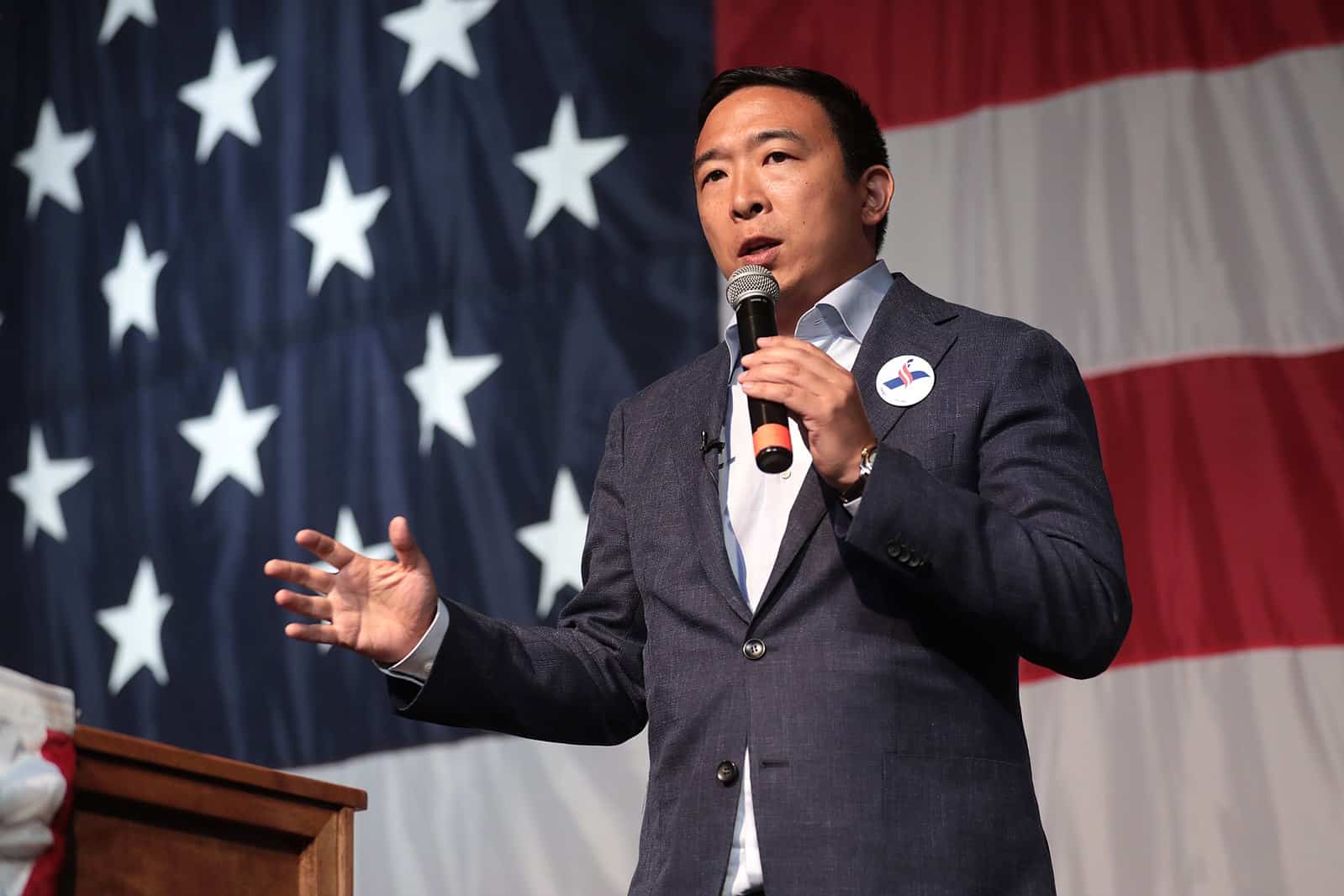
Tascha Shahriari-Parsa is a student at Harvard Law School.
Most associate the call for Universal Basic Income (UBI) with former presidential candidate Andrew Yang, whose proposal for a “freedom dividend” of $12,000 a year to every American was the central message of his campaign. Running for mayor of New York City, Yang brings a modified cash relief program that would give an average of $2,000 annually in cash relief to New York’s poorest—relief that would not affect other forms of social assistance. But Yang didn’t come up with UBI—so where did he get the idea?
While UBI goes back at least as far as Thomas Paine in 1797, Yang credits his source of inspiration to Andy Stern, former president of the Service Employees International Union (SEIU). After leading SEIU and its 2 million members for fourteen years, Stern resigned from his role in 2010 because, as he put it, he had lost his ability to predict the future—without which he “couldn’t develop the inner compass needed by a leader who seeks to bring about major social change.” After Stern set out to answer larger questions about how to address the problems of the 21st century economy, he gravitated towards UBI as the best way “to eradicate poverty and give all Americans the opportunity to achieve their dreams.”
For both Stern and Yang, UBI is, at least in large part, a solution to growing concerns over the role that automation will play in creating mass unemployment. As Yang pointed out on his campaign trail, self-driving truck technology could easily render millions of Americans without a job in the blink of an eye. And it’s not just truck drivers: a 2016 federal report found that 83% of jobs making less than $20 per hour could be lost due to automation. This doesn’t mean that labor will become obsolete—jobs displaced by technology will eventually be replaced by jobs in other areas. But what are you supposed to do if you’ve been driving trucks your whole life? Learn how to code? How would you survive in the interim?
Perhaps unions can mitigate the ‘side-effects’ of technology. In 1812, the Luddites famously smashed textile machinery, giving rise to the modern usage of the term “luddite” to refer to a person opposed to technological progress. But contrary to the common myth, the Luddites were not against machinery. They were against their terrible labor conditions, demanding that whoever runs the machines should receive sufficient training and be paid a fair wage. In that sense, the Luddites’ demands were comparable to those of UNITE HERE hotel workers who went on strike throughout the country in 2018, winning mandated training for workers affected by new technology as well as a say over how new technology would be implemented.
Collective bargaining over the implementation of technology is an important part of the solution. But even if we organized the entire U.S. workforce into unions with enough power to negotiate such agreements, we wouldn’t stop mass layoffs. The key source of workers’ leverage over their employer—the ability to withhold labor—is predicated on the employer’s need for their labor in the first place. UBI isn’t a replacement for a union, but it can help fill a gap where labor otherwise has very little power.
And it’s not just about technology. When Marriot workers were negotiating their agreements in 2018, what they likely weren’t expecting was that 98% of their members would be out of work not as a consequence of automation, but rather, a global pandemic. Moreover, mass unemployment has always been endemic to capitalism. Even in the absence of crisis, there will always be millions of Americans without a job.
In a society as rich as ours, UBI is a declaration that everyone is entitled to an income, whether they work or not. UBI is also a proclamation that the poor should have the right to use their money as they see fit—that poverty is itself the issue, rather than a symptom of a lack of character or a ‘poor gene’. And given how wealth and power go hand in hand, UBI gives the working class a fighting chance to counter the power of the elite.
Moreover, a UBI would substantially alter the landscape of labor. If everyone is guaranteed a paycheck whether they show up to work or not, workers will have far more bargaining power than they do in the present. A $1,000/month UBI is not a living wage, but it’s a cushion that would give workers more power to leave a bad job—and thus more power to negotiate to make that job better. Serving the function of a strike fund, a UBI would also make it easier for workers to go on strike. Additionally, UBI would raise minimum standards on top of prevailing wages, allowing workers to save more of their bargaining leverage for everything else that matters.
But… How Do We Pay for It?
When Trump authorized $300-billion in direct cash relief last March, many saw a vindication of Yang’s campaign. Suddenly, the question had shifted from whether we should give everyone cash to how much we should give everyone and when. But even though stimulus checks have increased the popularity of UBI, authorizing emergency cash relief to keep our economy afloat during a recession is very different from making regular cash disbursements a permanent fixture. The three rounds of stimulus checks have cost the federal government over $850 billion. An annual UBI of $12,000 per adult American would cost $2.8 trillion a year. That money must come from somewhere.
This is why the question of UBI is really a question of taxation. “We’ve got to be talking about taxes,” Rutger Bregman said at the world economic forum in Davos in 2019. “All the rest is bullshit in my opinion.” A progressive UBI is ultimately a rearranged negative income tax, redistributing wealth from the rich to the poor. Is that politically feasible? Five years earlier, Bregman—advocating for UBI in his book Utopia for Realists—addressed our cynicism about the possibility of making such policies a reality in a greedy world. “My answer,” he wrote, “was this: turn off the TV, look around you, and organize.”
Organizing for such a fundamental redistribution of our wealth needs the backing of unions. If there is any institution that can organize—not just to change popular opinion, but to actually countervail the power of the elite and move UBI from our minds into matter—it is the labor movement. Just as the Marriot hotel workers won significant raises by going on strike throughout the country in 2018, union workers can play a central role in winning raises not just for themselves, but also for non-union workers and for the unemployed, and in so doing restructure our economic system and redefine our perception of work. A UBI would be a national collective bargaining agreement, tipping the scales of power towards the people at large.
UBI might not be a fight we can win tomorrow; but like any bargaining agreement, we won’t win unless we organize to raise people’s expectations of what’s possible and fight to make it happen. And that requires, at the very least, making it a part of our program.






Daily News & Commentary
Start your day with our roundup of the latest labor developments. See all
July 7
LA economy deals with fallout from ICE raids; a new appeal challenges the NCAA antitrust settlement; and the EPA places dissenting employees on leave.
July 6
Municipal workers in Philadelphia continue to strike; Zohran Mamdani collects union endorsements; UFCW grocery workers in California and Colorado reach tentative agreements.
July 4
The DOL scraps a Biden-era proposed rule to end subminimum wages for disabled workers; millions will lose access to Medicaid and SNAP due to new proof of work requirements; and states step up in the noncompete policy space.
July 3
California compromises with unions on housing; 11th Circuit rules against transgender teacher; Harvard removes hundreds from grad student union.
July 2
Block, Nanda, and Nayak argue that the NLRA is under attack, harming democracy; the EEOC files a motion to dismiss a lawsuit brought by former EEOC Commissioner Jocelyn Samuels; and SEIU Local 1000 strikes an agreement with the State of California to delay the state's return-to-office executive order for state workers.
July 1
In today’s news and commentary, the Department of Labor proposes to roll back minimum wage and overtime protections for home care workers, a federal judge dismissed a lawsuit by public defenders over a union’s Gaza statements, and Philadelphia’s largest municipal union is on strike for first time in nearly 40 years. On Monday, the U.S. […]